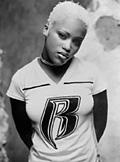The kids nowadays, they’ve got no sense of history. If it didn’t happen in their lifetime, well then, it didn’t happen at all. Let’s call it the diminishing rate of nostalgia. Look at it as applied to sampling: A decade ago, folks were sampling everything from jazz to P-Funk; five years ago, it was disco and early ’80s pop. Now, hip-hop samples hip-hop. How stunningly retrograde. The reason? It wouldn’t have been impossible for the youth of today (present company included) to grow up shrouded completely in hip-hop to the exclusion of all other genres—no tuning to the classic soul station, no rifling through the parents’ 8-tracks and vinyl, no curiosity at all.
As if that weren’t bad enough, hip-hop’s grown wide enough that even its adamant adherents can’t possibly keep up with everything from their own time period, no less the old school. Reissues, of course, fill that void and rewrite musical history at the same time. After all, if you missed it the first time, you sure as hell won’t question the revision that comes down the pipe a decade or two later.
Fortunately, today’s resurrectionists have history, not politics, on their mind. What’s far more crucial to the most recent slew of reissues is the goal of preservation, whether it’s giving new life to obscure old vinyl singles or CDs that never got their propers the first time around.
It was with that in mind that the editors of long-gone rap ‘zine ego trip compiled The Big Playback (Rawkus). Rather than offer any particular narrative history of the genre, they opted for antihistory, bringing together an amalgamation of tracks so ephemeral they easily slid past most radar checkpoints. But it’s not for lack of talent. Take a listen to Lord Shafiyq, Latee, MC Mitchski, and the Bizzie Boyz and wonder why they never floated to the surface. To ground the collection, there are more recognizable names like Grandmaster Caz, Marley Marl with MC Shan, and Craig Mack (in an early incarnation as MC EZ), but their presence isn’t as important as the others. The Big Playback proves the inherent flaws with ossifying history and how the reissue can be a tool of resistance.
In the wake of The Big Playback, several other ambitious collections are being attempted, with Vinyl Exams (Epic) being first to market. Hosted by New York’s legendary underground radio host Bobbito Garcia, Vinyl Exams attempts a more accessible history of early hip-hop. Instead of digging through the crates and working the phones to track down long-neglected artists, the curators of this album chose the path more traveled, taking obvious vinyl-only releases and transferring them to CD for the novice. While the cohering force of The Big Playback was obscurity, no such grandiosity is attempted here, though the mix of Schoolly D, Just-Ice, Sweet Tee, and Super Lover Cee & Casanova Rud is a great primer for the wholly uninitiated.
Sometimes artists and labels are barely in the ground before they get their hagiography on. Take Solesides, the epicenter of Bay Area intellectualism. Dissolved just two years ago (and already reborn as Quannum), the collective wasted no time in repackaging their legacy in double-CD format. Solesides Greatest Bumps is a formidable collection, if only because no one knows how to curate a group’s progression like the group themselves, and whether it’s lost DJ Shadow sides, early limited-run Blackalicious, or some damn fine Lyrics Born verses, they demonstrate a power that when presented together is overwhelming.
The same can be said for two recent greatest hits collections culled from the back catalog of New York’s influential Cold Chillin’ label. Basically the production house of production innovator Marley Marl, Cold Chillin’ was like the Loud Records of the late ’80s, releasing artists with tons of street cred but who were still intelligent. These two collections, one from Kool G Rap & DJ Polo, the other from Biz Markie, show the label at its extremes—fiercely literate thuggishness on the one hand, and street-corner tomfoolery on the other—and are essential for understanding the moment a decade ago when hip-hop was beginning to understand its myriad possibilities.
Finally, this year has seen a trio of CD releases that have saved its music from perpetual obscurity. The soundtrack to Fear of a Black Hat (Avatar) revives the original CD release, which numbered only in the thousands. Here, we see Rusty Cundieff’s sharp comic tongue and where CB4 stole all its jokes from. KMD’s Black Bastards (Readyrock) never really came out the first time, lost in label bureaucracy. Years of bootlegging finally prompted this proper release, putting to bed the quest for this greatest of lost hip-hop albums. And lastly, there’s the CD reissue as marketing tool. A side project of Kool Keith and Godfather Don, The Cenobites LP was the first major vinyl release for Fondle ‘Em Records four years ago but, because of label owner Bobbito’s aversion to CD (which he seems to have gotten over nicely this year, see above), was never given digital release until now, demonstrating that it’s possible to create built-in obscurity by limiting your release format. What was I saying about diminishing rate of nostalgia?








